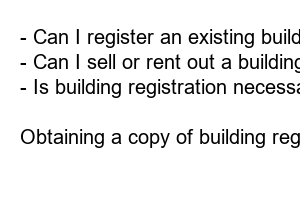건물등기부등본
Copy of Building Registration: Ensuring Legal Compliance and Peace of Mind
In any country, building registration is an essential procedure that ensures legal compliance and helps maintain public safety. When constructing or renovating a building, it is crucial to obtain a copy of building registration, which serves as proof of compliance with the necessary building regulations and codes. In this blog post, we will discuss the importance of obtaining a building registration copy and how it contributes to the overall well-being of individuals and communities.
1. What is building registration?
Building registration is the process of officially documenting the construction or renovation of a building with the relevant authorities. It involves submitting all the required documents, plans, and certificates to demonstrate that the construction project meets the necessary safety and structural standards. Once approved, a copy of building registration is provided as evidence of compliance.
2. Why is building registration necessary?
Building registration is necessary for various reasons. Firstly, it ensures that the building has been constructed or renovated according to established regulations, such as fire safety measures, structural integrity, and accessibility for persons with disabilities. Secondly, it helps protect the rights and interests of both the property owners and future tenants by guaranteeing that the building is safe and meets all legal requirements. It also aids in efficient urban planning and management of resources.
3. How to obtain a copy of building registration?
To obtain a copy of building registration, one must follow a series of steps. It usually begins with hiring a qualified architect or engineer who will prepare the necessary plans and documents. These documents are then submitted to the local building authorities, along with the required fees and permits. The authorities will review the submitted documents, conduct inspections if necessary, and finally issue the building registration certificate along with a copy.
4. Benefits of having a copy of building registration
Having a copy of building registration brings several benefits. Firstly, it provides legal evidence of compliance with building regulations, which can be crucial during property transfers or disputes. Secondly, it ensures that the building is structurally sound, minimizing the risks of accidents or structural failures. Furthermore, a registered building often enjoys higher market value and credibility, making it an attractive asset for potential buyers or tenants.
5. What happens if a building is not registered?
Building registration is not optional; it is a legal requirement in most jurisdictions. Failure to register a building can result in penalties, fines, or even legal consequences. Additionally, unregistered buildings might not meet the necessary safety standards, putting occupants and neighboring properties at risk. Insurance coverage may also be affected if the building lacks proper registration.
6. Frequently asked questions about building registration
– Can I register an existing building? Yes, it is possible to register an existing building by following a similar process as for new constructions.
– How long does building registration take? The duration varies depending on the complexity of the project and the efficiency of the local authorities. It can range from a few weeks to several months.
– Can I sell or rent out a building without registration? It is highly recommended to have a valid building registration before engaging in any real estate transactions to protect one’s own interests and the interests of the buyer or tenant.
– What documents are required for building registration? The required documents may include architectural plans, structural calculations, NOC from relevant authorities, and completion certificates, among others.
– Is building registration necessary for small renovations? Building registration requirements may vary depending on the nature and scale of the renovations. However, it is always advisable to consult with the local authorities to determine if registration is necessary.
– Can I trust the building registration authorities? The building registration process is designed to ensure transparency and accountability. However, it is essential to verify the credibility and authority of the registration department or agency to avoid scams or fraudulent practices.
Summary:
Obtaining a copy of building registration is crucial to comply with legal requirements, protect the interests of property owners and occupants, and ensure public safety. It involves a systematic process of submitting documents, plans, and certificates to local building authorities. Having a copy of building registration provides evidence of compliance, enhances property value, and contributes to efficient urban planning. Failure to register a building can lead to penalties and risks for occupants and neighboring properties. To ensure a successful registration process, it is advisable to consult professionals and engage with trustworthy authorities.

